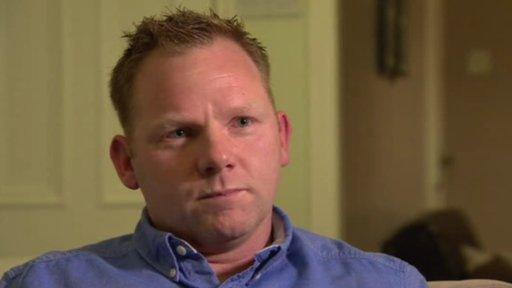Cliftonville football club helps Holy Cross boys' school promote reading
- Published
Holy Cross literacy co-ordinator Janmarie Reel addresses the fathers at the training course
A north Belfast primary school has enlisted the help of a football club to encourage dads, uncles and granddads to read alongside young boys in their family.
Holy Cross Boys' School designed the initiative, external because they believe most reading practice is led by women.
They said boys need to see a male role model reading.
Cliftonville Football Club is helping by allowing leaflets to be handed out at a match at the Solitude ground.
A number of its top players have joined in the publicity campaign to encourage their young fans to read.
Some of the players have also been reading alongside their sons and nephews.
'No greater gift'
Teachers say even ten minutes reading, man to boy, every evening, can make a real difference.
Male relatives have been through the first training programme at the school in Ardoyne.
The vice-principal, Chris Donnelly, said: "There is no greater gift a father can give his son than the love of reading.
"Often it is the mother who sits with a book, but we want to encourage men, even though some are not very confident in their own reading, to sit down each evening and read with the boys for pleasure."

Postal worker Jim Mallon took the training course to enable him to read with his son Antoín
Many boys are more enthusiastic about maths and science, yet it is acknowledged that reading well is the key to future success.
Jim Mallon has taken the training course and is determined to sit down to read with his six-year-old son Antoín.
"I'm a postal worker and although I do some homework with Antoín, it's my wife Claire who usually does the reading," he said.
"She is more educated than me, but I am keen to do my bit. I have found that reading with my son has inspired me to do more reading for pleasure.
"We all go to the library together to choose our books."
'Mistakes'
The tuition session at Holy Cross boys' school was for men only and more than 40 turned up to get tips on how to read for pleasure rather than homework.
The school's literacy co-ordinator, Janmarie Reel, explained that the reading sessions should use material which interests the boys; often non-fiction such as film reviews, sports reports or instruction manuals.
"It is important not to correct the boys' mistakes too quickly, let them work it out for themselves with a little help from you," she said.
"It's a chance to allow the boys to sit alongside male relatives and enjoy what they are doing."